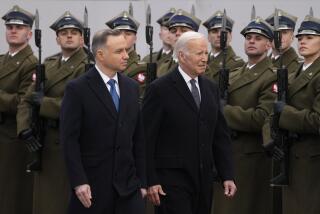IMF Loans Must Be Linked to Reform
- Share via
Oddly, some Russian leaders view NATO’s military intervention in Kosovo as a threat to their national interests. To the contrary, the bombing campaign may accelerate an International Monetary Fund agreement for additional assistance to Russia’s ailing economy.
NATO nations seem willing to go along with additional IMF aid to Russia to prevent it from intervening on Serbia’s side in the Balkan conflict. Aid, they hope, will persuade Russian Prime Minister Yevgeny M. Primakov to pressure Yugoslav President Slobodan Milosevic to cease hostilities permanently.
The principles for further assistance, according to Russian officials, have already been agreed to, but this is not a good trade-off for the rest of the world, because it is likely that the aid will be provided without the usual economic reforms that are expected of other countries that get IMF funding. In fact, rated on economic merits alone, Russia would not qualify for continued help.
This isn’t the first time the West has erred in dealing with Russia’s economic problems. Most Western governments, the U.S. Treasury, the World Bank and the IMF--while endorsing long-term political reforms--have acted on the belief that the Russian economy must first be fixed, because making political changes during economic reform is unmanageable and may even jeopardize short-term economic recovery.
Economic crisis is exactly the time to make political changes--as evidenced by the considerable political reforms in Argentina, Chile, Poland and Thailand. Once the crisis ends, those who benefit materially from the existing political system will oppose its change.
The recent history of Russia and Poland amply illustrates the importance of making economic assistance dependent on political change. In the early 1990s, the Poles reformed their political institutions at the same time that they shifted to a market-based economy, and they have enjoyed relative economic and political stability. The Russians sought to adapt existing institutions rather than construct new ones suited to their changed circumstances and they failed, both economically and politically. Unlike Poland, Russia’s reforms did not include an effective legal system for resolving business disputes and enforcing property rights; a stock market that provided investors with information about how companies were performing; a tax system that collected revenue without massive evasion, and a decentralized, competitive democracy with national political parties that contended in legislative and presidential elections.
Russia has ineffectively regulated its market economy. As a result, business disputes are often resolved with hit men; land is not effectively bought and sold because titles are ambiguous; stock valuations are meaningless since the numbers are known only to the company managers; taxes are rarely collected and political parties are subordinate to charismatic leaders seeking the almost-unfettered power of the Russian presidency.
The first burst of economic reform in Russia created many winners who accumulated great wealth. These new tycoons were threatened by political reform in legal enforcement, true property rights over land and effective accounting standards that made corporate finances and tax reform transparent. Nor was President Boris N. Yeltsin willing to promote reform; he needed the tycoons to raise money for his 1996 presidential election.
However, renegotiating continued IMF support does afford an opportunity to tie economic assistance directly to specific economic and political changes. The centralized apparatus still in place from the Soviet era must be abandoned. A new constitution balancing power among the executive, legislative and judicial branches can help advance transparency and accountability in government.
Unless the Russian politicians are prepared to put their own hold over power at political risk, economic assistance will not produce political reform. IMF money should follow institutional reform, not lead it. It is counterproductive for the IMF to help local oligarchs preserve their power at the expense of local taxpayers and thereby make it harder to build the foundations of successful liberalization.
By using its money to try to solve strategic problems like the war in Yugoslavia, the IMF loses its capacity to promote economic reforms.
International assistance will be meaningful only if it helps Russia’s leaders confront basic structural problems in their own economy. But the Balkans conflict has given Russia a timely excuse to avoid that day of reckoning.
More to Read
Sign up for Essential California
The most important California stories and recommendations in your inbox every morning.
You may occasionally receive promotional content from the Los Angeles Times.













